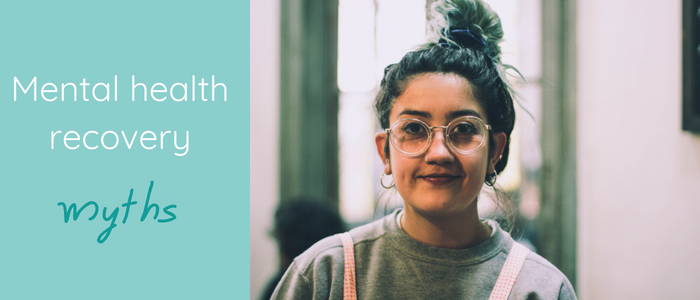Mental health recovery myths
Mental health conditions come in many guises. Some are seen as things we can ‘recover’ from, while others are life-long conditions we learn to live with. If you have a condition that is seen as recoverable, it’s natural for recovery to be the end goal.

The road to recovery however is rarely simple, and even when we are deemed ‘recovered’, it doesn’t mean the hard work is over. For many, mental health is an ongoing journey that we have to navigate.
The myths surrounding mental health recovery can make the reality a shock for some people. Here are some common recovery myths, and the truth behind them.

This one thing is all I need to recover
For some, hope will be placed in just one thing to help them recover. This may be medication, therapy or joining a support group. The truth is, mental wellness usually involves many different elements working together, and these will vary for person to person.
For example, medication alone may help ease your symptoms, but without tackling the underlying issue, you may struggle to move on. For many, managing mental health requires a combination of support from friends/family, professional help through your doctor or therapist (this may include medication) and ongoing self-care.
Once I’ve recovered I can stop worrying about my mental health
This is a little bit like saying once a broken leg is healed, you never have to worry about your physical health again. Mental health is something we all live with, all the time. And unfortunately, if you’ve struggled with one mental health condition, you may be prone to developing more.
Rather than living in fear and trying to ignore your mental health, try and see your recovery as a learning tool. What has helped you recover? What do you need to be mindful of in the future? Raising your awareness of stress levels and general mental health will help you to react quickly when warning signs appear, so you can get the support you need, when you need it.
Recovery is the ultimate goal
 While of course, if your mental health condition is one you can ‘recover’ from (such as an eating disorder), recovery needs to be a goal of yours.
While of course, if your mental health condition is one you can ‘recover’ from (such as an eating disorder), recovery needs to be a goal of yours.
But rather than focusing on some abstract idea of recovery and seeing it as a shiny, happy place where nothing can go wrong, consider making your goal about self-discovery.
You are learning how to navigate an illness and move on from a particular time in your life. You’re learning the tools you’ll need to flourish in the future.
“Therapy is a great opportunity to confront any problems we have and make a new start. It can also be a fascinating place of self-discovery, and a place to use that learning to make strategies for a better future.” – Counsellor, Steven G. Thomas.
If I relapse, I’ve failed
As hard as it may be to hear, relapse is often part of recovery. This doesn’t mean it is definitely going to happen, but preparing for it with your therapist can help you know what to do if it happens.
It’s easy to sink into sadness when a relapse happens, but try to remember that this does not mean you’ve failed. Mental health, by its very nature, if difficult to navigate. We can’t always predict when something in life is going to send us into relapse.
Knowing that you have got through it before and knowing what you need support-wise to help is key. If relapse is something you’re worried about, talk to your therapist and see if you can put a plan together so you know what warning signs to look out for and what to do if you think you’re having a relapse.
When talking to Happiful, author and mental health campaigner, Natasha Devon likened recovery and relapses to knitting:
“A set-back, be it a drinking binge, an episode of self-harm, or the odd day where getting out of bed seems like an impossibility, is like dropping a stitch in knitting – just because the stitch has been dropped, it doesn’t mean you haven’t already knitted a row.”
However you choose to see your mental health journey, it’s important to recognise it as just that – a journey. Sometimes it’s smooth sailing, other times storms throw you off course. Having the right support in place can help you stay upright and remember that those smooth seas can be found again. You’re more capable than you know.

Find a therapist dealing with Mental health
All therapists are verified professionals


